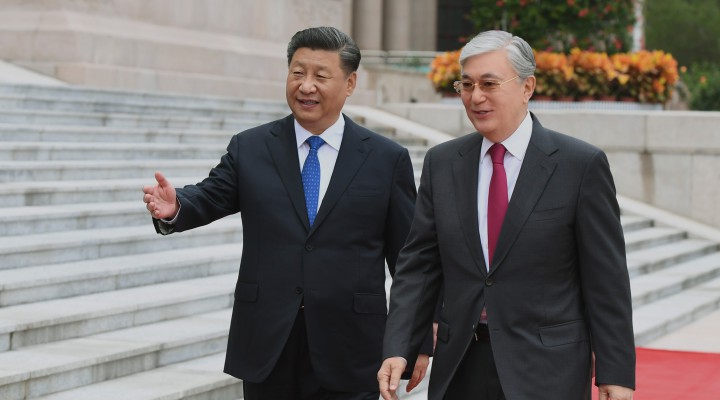China Can Play A Crucial Role In Kazakhstan’s Democratic Security Strategy

President Tokayev’s Sinologist credentials and the many experiences that he acquired while working in China make him the perfect leader for implementing his country’s new common prosperity policy and consequently enhancing its democratic security through the formation of new social contract.
Last week’s Hybrid War terrorist attack on Kazakhstan has finally ended following the Russian-led limited peacekeeping mission by the Collective Security Treaty Organization (CSTO). The alliance’s support was requested by that country’s universally recognized leader, President Kassym-Jomart Tokayev, and promptly achieved its mission of stabilizing the situation. Their troops guarded strategic facilities and thus enabled the Kazakhstani forces to fully concentrate on anti-terrorism and law enforcement.
Their impending withdrawal, which President Tokayev announced on Tuesday will begin on Thursday and should be completed within 10 days afterwards, has prompted observers to wonder what’ll happen next in that country. After all, what was hitherto regarded as among the region’s most stable countries was rocked by preplanned weaponized protests (Color Revolution) that morphed into an anti-state terrorist campaign (Unconventional War) according to Monday’s CSTO leaders’ summit.
Kazakhstan must therefore do its utmost to preemptively thwart such dangerous scenarios in the future, which requires a comprehensive strategy. Policies that are designed to counter Hybrid War tactics and strategies can be referred to as “democratic security” since they aim to secure the national model of democracy in whichever country they’re practiced. Kazakhstan, like all countries, has its own form of democracy that’s always improving through constructive self-critiques and proactive reforms.
President Tokayev is taking the initiative to decisively implement an ambitious democratic security strategy. He announced on Tuesday that Kazakhstan “will continue its course towards political modernization…Overall, a transformation of relations between the state and the society is overdue. We need a new format of a social contract.” Additionally, he froze the salaries of senior-level bureaucrats and condemned his country’s monopolies that he blamed for worsening the economic situation.
Most interesting, however, was President Tokayev’s request for big businesses to make regular contributions to a new social welfare fund. This very closely resembles what Chinese President Xi Jinping requested last year when articulating his visionary policy of common prosperity. One of the key points is for big businesses to contribute more to society. This is not only a pragmatic policy, but also the most humane one because such economic entities have a social responsibility to their compatriots.
It might not be a coincidence that President Tokayev is closely emulating this policy as part of his country’s democratic security aimed at forging a new social contract. The Kazakhstani leader is a Sinologist who studied Mandarin at the Moscow State Institute of International Relations (popularly known as MGIMO by its Russian abbreviation). It’s run by the Russian Foreign Ministry and globally renowned for training that major country’s world-class diplomats. He even served in China before, too.
President Tokayev’s personal and professional experiences in learning about socialism with Chinese characteristics firsthand might have inspired him to replicate some of President Xi’s common prosperity policies. Kazakhstan is very close to China, even being the country where President Xi announced the Belt & Road Initiative (BRI) in 2013. It plays an irreplaceable transit role in the Eurasian Land Bridge for connecting the Eastern and Western halves of Eurasia via its geopolitical Heartland of Central Asia.
Kazakhstan’s implementation of its own common prosperity policy will certainly go a long way towards ensuring the country’s democratic security. In fact, it’s arguably the basis upon which this entire strategy is built in every state that implements it. Without an equitable distribution of wealth from big businesses to the common people, anti-elite resentment might develop and subsequently be exploited by external forces through information warfare propagating demagogic anti-state narratives.
Democratic security’s most important goal is to thwart Color Revolutions, or weaponized protest movements organized by foreign forces. This first half of the kinetic phase of Hybrid War (the second being Unconventional Warfare or terrorism) capitalizes on socio-political grievances that are more often than not closely connected to economic challenges or the perception thereof. By requesting that big businesses contribute to common prosperity, governments can greatly mitigate this threat.
In this sense, China’s respective policy can be seen as influencing Kazakhstan’s. Furthermore, the comprehensive strengthening of economic relations between these neighboring countries will enhance the common prosperity of their peoples and nations. The ongoing plans to synergize the Eurasian Economic Union (EAEU) of which Kazakhstan is a part with China’s BRI will enhance all of Eurasia’s common prosperity, especially upon the full completion of the Eurasian Land Bridge and other projects.
President Tokayev’s Sinologist credentials and the many experiences that he acquired while working in China make him the perfect leader for implementing his country’s new common prosperity policy and consequently enhancing its democratic security through the formation of new social contract. Kazakhstan can always rely on China for help to fulfill all its needs, exactly as President Xi promised last week. China’s brotherly assistance will help Kazakhstan become more stable, prosperous, and secure.
 TheAltWorld
TheAltWorld 
0 thoughts on “China Can Play A Crucial Role In Kazakhstan’s Democratic Security Strategy”